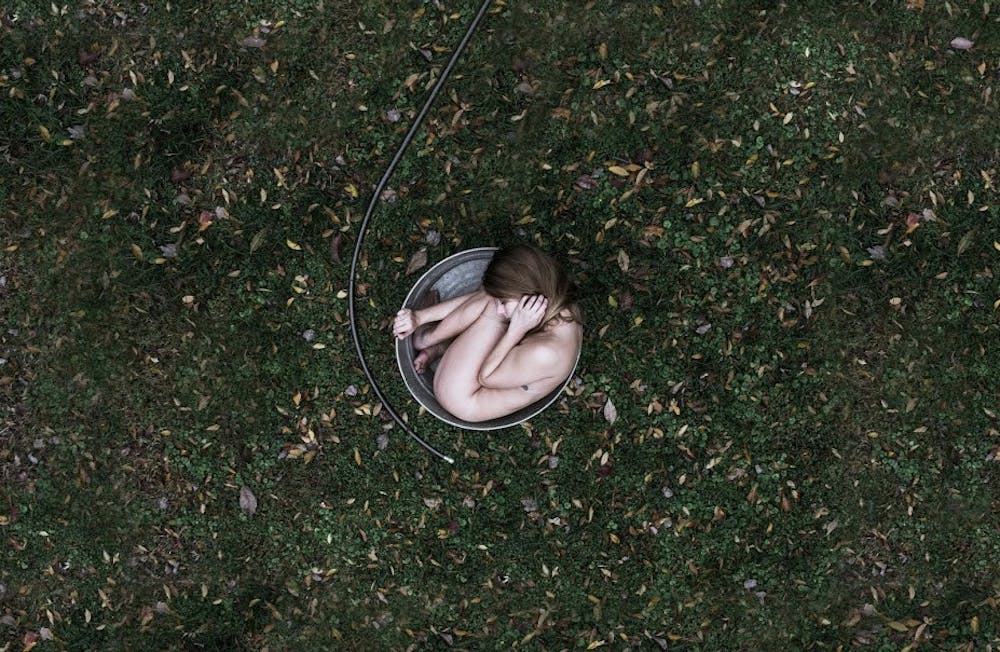In late fall of 2016, students at UR read yet another article about a sexual assault that had happened on campus, and how the administration had failed to help. Outraged, students called for reform, and the school began to work with the student body to ease the pain and change the future.
Cristina Peters, a junior from Richmond, used a different mode of expression to share her thoughts on the matter: photography.
Westhampton College student Cecilia Carreras wrote a blog post in September on the Huffington Post contributor network, calling out UR on the way its administration handled her reported sexual assault case the previous year. The article prompted dismay across campus, and led to reform by the administration on how to deal with sexual assault. There were multiple forums held and discussions had.
At the University’s annual Take Back the Night event in the spring, many students felt compelled to stand up and share their own sexual assault stories.
“I admire the people so much who get up and speak,” Peters said. “There have been so many times when I’ve wanted to get up and speak about my experience, and it’s scary. It’s scary to get up and speak in front of all those people.”
That’s part of what inspired Peters to create her own project.
“I was able to tell my own story a little bit through my artwork, which is something I’m a lot more comfortable doing than standing up in front of people, talking.”

When Peters' photography professor Tom Condon assigned her a photography project with the title, “small spaces,” she knew she wanted to do a project on sexual assault, especially because of the events that occurred on campus throughout the semester. The idea for her project stemmed from a conversation she had had with her family about what counts as rape.
“I feel like it’s really hard to hear ‘no, you weren’t raped’ if you feel like you were raped,” she said.
Enjoy what you're reading?
Signup for our newsletter
Peters say she is trying to send a message to victims that they aren’t alone and that their feelings are valid, no matter where on the spectrum of sexual assault their experience falls. She says she wants them to know that they shouldn’t have to be afraid of how their experience will be seen based on how society defines rape, and that there isn’t one specific definition of sexual assault.
Peters began by looking for locations to shoot where she could find spaces that were smaller than ordinary, but could still fit a model. Her first idea was to shoot in a warehouse her parents were renting. From there, she found models in her teammates on the dance team at University of Richmond.

When she initially asked for models, she didn’t tell them what they would have to do. Once they were willing to model, she told them the catch — that they would be nude.
“We all were kind of like, 'oh that changes things a little bit,'" Deirdre O’Rourke, one of the models, said.
Twelve of the dancers were willing to participate despite the new conditions.
“I don’t think it would have had the same effect if we weren’t nude,“ Madison Ernstes, another model, said.
Peters was surprised that so many of the dancers volunteered.

Some of the models were able to work through their own experiences with sexual assault through the shoot.
“It was something I had been grappling with at the time,” one of the models said. “It really became a therapeutic thing. It was like you were taking control of the situation.”
Peters, along with her professor and mentor, Condon, are looking for a space for the project to be publicly displayed so their message can reach more people.

The project, while printed and turned in for class, isn’t over for Peters. She plans to continue the project. She wants to add more models, including male subjects and doesn’t know when it’s going to end.
“Every single time I went to take another picture I started having more ideas,” Peters said. “But when I take the last picture, I’ll know that it’s the last picture.”
Contact contributor Maggie Pope at maggie.pope@richmond.edu
Support independent student media
You can make a tax-deductible donation by clicking the button below, which takes you to our secure PayPal account. The page is set up to receive contributions in whatever amount you designate. We look forward to using the money we raise to further our mission of providing honest and accurate information to students, faculty, staff, alumni and others in the general public.
Donate Now



